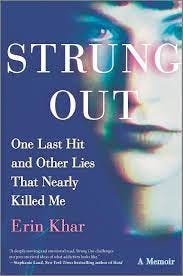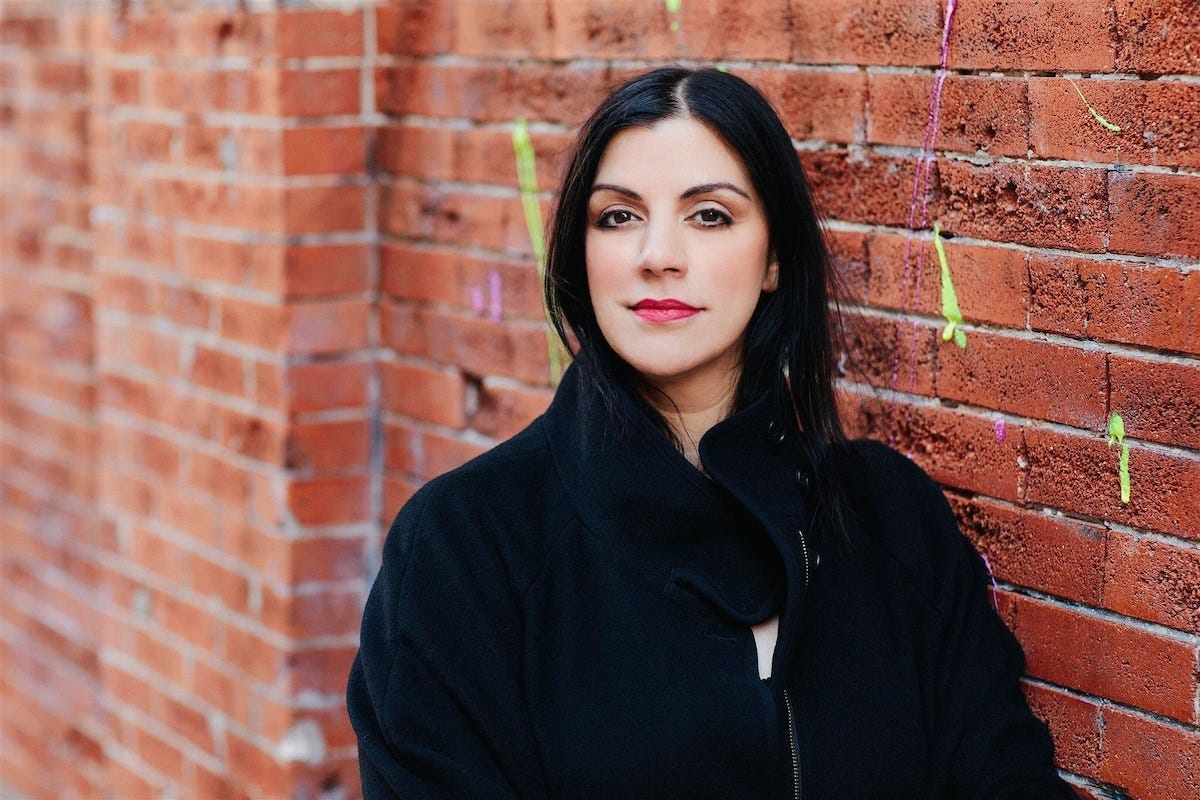Purchase STRUNG OUT
Erin Khar is an author and advocate known for her writing on addiction, recovery, mental health, parenting, and relationships. Erin knows first-hand the challenges of addiction recovery. At just 13, she began a 15-year struggle with heroin addiction. With 19 years of recovery, she has established herself as a respected voice in the national conversation about the overdose epidemic.
Erin's debut memoir, Strung Out , appeared on most anticipated lists from Apple Books, Goodreads, SELF, The Rumpus, Bitch Media, and others. Of the book, The New York Times writes, "Khar’s buoyant writing doesn’t get mired in her dark subject matter. There is an honesty here that can only come from, to put it in the language of 12-step programs, a 'searching and fearless moral inventory.' This is a story she needed to tell; and the rest of the country needs to listen.”
She writes the popular weekly advice column on Substack, Ask Erin ( ed note: Erin’s column is such an interesting read and she has a true knack for loving advice- she’s on my BOOKS & WOMEN recommended list for a reason! ) and her personal essays have appeared in SELF, Marie Claire, Salon, The Times of London Sunday Magazine, HuffPost, Esquire, Cosmopolitan, and others. She lives in New York City.
PHOTO ROLL STORY
The writer picks five out of ten pop-up questions and answers them.
I took this photo on a recent trip to The Whitney with my younger son Franklin (who just turned five). The room is part of the large Whitney Biennial exhibition. I love days like this—when I am reminded of the magic of being a mother and witnessing things alongside this young human. I am also so grateful to live in New York City and have access to so many experiences, both for myself and my children. My memories of experiencing art as a child have stuck with me and shaped who I am as a writer and person.
POP UP QUESTIONS
The writer picks a photo from her phone and tells us about it.
What book do you wish you could read again for the first time and why?
Oh, there are so many. Two immediately come to mind—Lidia Yuknavitch’s The Chronology of Water and Jeanette Winterson’s Written on the Body. OH, and Dorothy Allison’s Bastard out of Carolina. All three of these books were read in one sitting and changed the shape of me. Lidia has been such a support and mentor to me. She wrote the introduction to Strung Out and I can still hardly believe it! The first time I read her intro, I sobbed—full body, core-shaking sobs—because I felt SEEN. She is one of those beautiful, magical humans who really sees people in a way that is so damn rare.
What is a quote that has endured in your mind?
“Keep passing the open windows,” from John Irving’s The Hotel New Hampshire. If you haven’t read it—the book chronicles the Berry family and their unusual lives that are full of love and sorrow and everything in between. I would later come to learn that the book had mixed reviews and many people think it pales in comparison to other works by Irving that contain similar themes, places, and motifs. But for me, the book became a part of me, like skin. What stuck with me, what continued to stick with me—as I grew from a little girl secretly reading her parents' books, to a teenager and young woman who bounced between heroin and men and the overwhelming urge to kill herself, to a woman who finally wanted to live, wanted to love—was the Berry family refrain: “Keep passing the open windows.” Keep passing the open windows. I've passed so many open windows. And sometimes I stuck an arm or leg out and came back a little broken. But I always passed them. And I’m still here. I’m still here.
How has technology been a part of your writing?
Technology has been a HUGE part of my writing—in how I physically write, how I connect with readers, how I manage my career, and on and on. The internet made it possible for me to find and build an audience, and, more importantly, find my writing community. So many of my friendships are a direct result of tech—social media in particular. In terms of the physical tech, being able to write on my laptop gives me the freedom, like so many other people, to work from anywhere. My phone has made things even more accessible. I constantly take notes on my phone when I am out and about, walking around the city—it’s where my best thinking happens. I have written character notes, plot points, pieces of dialogue, and entire scenes. When I’m driving, I use voice notes in the same way. I am 100% pro-tech. And, for all the complexities of living our lives online, the benefits are far more valuable.
What music do you love on road trips?
My writing is definitely shaped by music. I make a playlist for every book-length project I’m working on and I like to listen to them when I drive because it allows me to do more of that pre-writing—getting inside the theme or the characters of a story. In a general sense, some road trip favorites are Radiohead, Beyoncé, Lucy Dacus, Corrina Repp, The Pixies, Mazzy Star, Prince, and random 90s playlists!
What books comfort you?
John Irving’s The Hotel New Hampshire and The World According to Garp. ( ed note: also two of my favorite books ever! ) I read both of them at an inappropriately early age! But they had such an impact and I found comfort in them as a child when I was struggling with big feelings that I didn’t quite understand. Jeanette Winterson’s The Passion, Oranges are Not the Only Fruit, and Written on the Body. My copies are very worn with lots of annotations. Flaubert’s Madame Bovary is another one I could read again and again. OH! Also, Louise Penny’s ‘Inspector Gamache’ series. I just love them—the fictional town of Three Pines, Armand Gamache, the residents of the town, Quebec, all of it!
THE INTERVIEW
The writer answers questions about her life and work.
STRUNG OUT is a memoir of your journey of addiction. Did anyone ask you to leave them out, or redact stories, and how did you work with that?
No one asked me to leave them out. Certainly, there were family stories that I omitted because they didn’t make a difference looking at the narrative as a whole, or they weren’t my story to tell. I was sensitive about not exposing anyone unnecessarily, always casting the harshest light on myself. I wanted to be transparent without “throwing anyone under the bus.”
Because I changed most names in the book, there was a slight buffer. With my parents, friends, ex-boyfriends, etc.—I allowed them to read the book in advance once I had finished it and review copies were out. As a rule, I think with memoirs, it's best not to have anyone read the work until it's finished. You'll end up censoring yourself. At that point, not much could be changed, but I wanted them to be prepared, and if there was any significant error, they could let me know. Some people chose to read in advance, and some did not. No one took issue with anything in the book, which was a relief. Funny enough, the only shady comments I received were from a couple of people who were NOT in the book!
Looking back at STRUNG OUT now, how do think its publication changed your life?
The book has opened new doors for me as a writer. However, I am most grateful for the connections I have made with people who have read the book and been impacted by it.
Last year, I was having a bad day. I’d been working on ideas for my next book and was back to questioning the importance of my work and whether or not my voice had a place. Then, a message popped up in my inbox through the contact form on my website. It was from a woman who lost her sister to an overdose. Her sister had told their mom about my book—how much it meant to her—and that we'd corresponded. She wanted to know if I remembered her sister.
As a longtime advice columnist, and especially after the book came out, I get many emails and DMs from people going through similar situations. I wasn’t sure I knew this woman’s sister, but I did find our correspondence after looking through my messages. Her sister had reached out to me a month before she died. She’d told me how much the book meant to her, how she was in a mentally fragile place, how the book gave her hope, and that the book made her feel seen in a way she'd never been.
Before I replied to the woman about the correspondence, I sat quietly and wept. Then, I relayed what her sister had shared with me. She thanked me. She thanked me for giving her sister the gift of being seen. She told me it gave her and their mother a sense of peace to know that her sister had felt understood by someone, even if it was a stranger. She thanked me because the book allowed their family a means to understand what her sister went through in a way they hadn’t before.
I am overwhelmed with emotion as I retell this here in these words. Because this is why I wrote the book, this is why the book matters. This is the value of sharing our stories.
Strung Out was published a couple of weeks before everything shut down in 2020. Although I could only do four book tour events before the shutdown, I was fortunate to continue with speaking engagements conducted remotely. I spoke with doctors and nurses, social workers and psychiatrists, law enforcement, addiction counselors, and public health policymakers. Those opportunities reminded me of why I wanted to write the book, to begin with—to open conversations, reduce stigma, and effect change.
During one of the few in-person book events I had, an audience member asked, “Like you, I’ve lost so many to addiction. What do you do with all that? How do you move on from it?”
I thought about it for a moment and said, “Well, for me, part of the way I processed it was to write this book. I wrote this book for the ones who didn’t make it… because their lives mattered.”
I often think about this when I doubt my purpose as a writer. It’s not about me. It’s about the people who need the words, who need to understand, who need to be seen. As I wrote at the very end of Strung Out:
This book is for the ones who didn’t make it. This book is for the ones who survived. This book is for the ones who are still struggling. I see you. I believe in you.
I love you.
This is my long-winded way of saying that the book's publication has reinforced why the work matters to me!
Do you ever feel nervous that your sobriety is shaky? How do you support yourself?
At this point, more than 19 years into recovery, I don’t feel nervous about it. The biggest reason is that I have built a vast professional and personal support network to ensure that I am tending to my mental health.
I know how to ask for help when I need it. That’s a massive difference between me now and me when I was continually relapsing.
Also, heroin really stopped working for me in the end. I was joking with someone recently that I think I used up all of my opiate fun receptors. When I have had surgery in the last 19 years and needed opiates in the hospital or at home post-surgery, it has been almost a letdown! Because it doesn’t give me any of the “relief” it used to provide. Instead, it makes me anxious and depressed. My body kept the score on that one! And so, it just has not seemed like anything to reach for. I haven’t had a craving in so, so many years.
All that said, staying on top of my mental health, as I mentioned, is KEY for me. So this includes meditation, exercise, talk therapy, psychiatric medication, etc.
What has writing during Covid looked like and felt like for you?
It was a challenge at first. During those early months, I had a 16-year-old and two-year-old at home with no childcare, and both my husband and I were working from home. It was a lot.
Now, things feel more or less as they did before. I have a writer’s coworking space close by, as well as the usual—cramming writing around my younger son’s school/camp schedule. So I am in a good place now managing it. But, of course, I am always eager to get away for a quick writing retreat here and there!
I have been so grateful for my writing community. I don’t know what I would do or where I would be without the support of writer friends. We need each other—for moral support, venting, feedback, etc.
Describe your writing space for us? Do you have writing rituals?
I like to move around a lot! If I write from home, I go between a small desk in our living room, the dining room table, sitting on the couch or bed with a lap desk, or standing at the kitchen counter. My writing co-working space is close by, with all sorts of desks and nooks to write in, too. I need to switch it up frequently.
What are you working on now?
I have several projects (I am nonmonogamous as a writer!), but my primary focus at the moment is a novel that I am really excited about. It’s been living in my head for years and coming together nicely. Outside of that, developing a few more writing projects, a lot of podcasting (I regularly co-host on Dopey Podcast ), and I recently moved my advice column, Ask Erin, to Substack!






